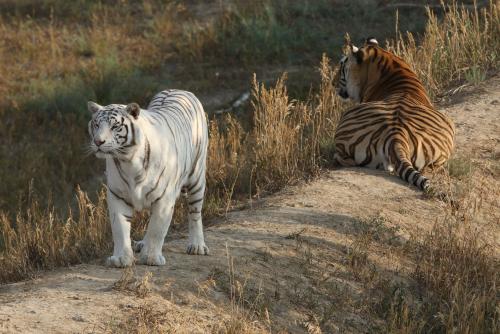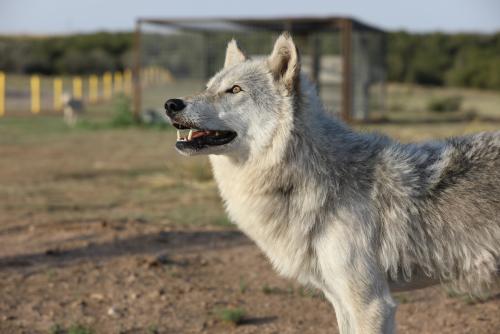More than 100 newly rescued exotic animals are experiencing a world they never knew existed. Some, for the first time, are walking on grass, tugging at evergreen branches and running more than 10 feet without hitting a fence.
This freedom came about following a year like no other for The Wild Animal Sanctuary, a non-profit 30 miles from Denver. Despite a global pandemic, the Sanctuary conducted rescue operations stretching from New Orleans to Dade City, Florida, to Pachuca, Mexico. Most notably, many of the animals came from breeders featured in Netflix’s popular documentary series, “Tiger King: Murder, Mayhem and Madness.”
The real danger came not from the animals, but from the breeders themselves who tried to thwart rescuers by harassing them and even threatening to wire explosives to the animals’ cages.
While it was a banner year for bringing public attention to the horrid world of roadside zoos and illegal captive breeding programs, the hard work is just beginning for the rescued animals.
COVID-19 CHALLENGES
 Saving exotic animals is never easy and, just like everyone else, the Sanctuary struggled to survive under COVID-19 restrictions and hardships but, at the same time, faced some unique challenges.
Saving exotic animals is never easy and, just like everyone else, the Sanctuary struggled to survive under COVID-19 restrictions and hardships but, at the same time, faced some unique challenges.
With more than 600 animals that consume about 85,000 pounds of food each week, the Sanctuary relies entirely on food donations from national big-box stores. But panic buying from consumers stripped the shelves bare, leaving no surpluses. The Sanctuary also saw a significant drop in monetary donations.
Despite all this, the Sanctuary was able to keep its staff employed and focused on animal care.
HIGH-PROFILE RESCUES
Netflix’s series brought unprecedented attention to the captive animal crisis, fueled by exploiters who find ways to avoid prosecution.
Breeders center their business models around tiger cub petting or charging people to sit, play and take selfies with baby animals. These animals spend their whole lives in tiny cages, often paired with malnutrition, genetic malformations and other underlying health disorders. Beyond that, these people also illegally breed and sell endangered cubs all over the country.
Netflix’s series spelled doom for two high-profile breeders, Joe Exotic of the Greater Wynnewood Exotic Animal Park in Wynnewood, Okla., and Tim Stark of Wildlife in Need in Charlestown, Ind.
Breeders like these purposely paired unrelated species of cats to create hybrids such as ligers, tigons, liligers and tiligers. The hybrids provide unique attractions to drive profits.
More than 40 animals, including African lions, tigers, wolves, felid hybrids, and grizzly and black bears were rescued by the Sanctuary in 2020 from the notorious “Tiger King” breeders. The captivating full stories on each rescue can be found in the organization's summer and winter 2020 newsletters.
 IMPORTANT WORK CONTINUES
IMPORTANT WORK CONTINUES
But rescuing exotic animals is only the beginning of a long rehabilitation process. Due to cross-breeding, the “Tiger King” animals show signs of genetic confusion after breeders undid thousands of years of evolutionary development. Some animals are first-generation hybrids while others are second generation. The ligers may chuff like tigers while others moan and roar like lions. Some do both.
An adorable liger cub named Indi, for instance, was too small and vulnerable to be placed with adult lions or tigers. Instead, she’s being raised by a pack of Irish wolfhounds led by Marcel, a fearless 8-pound Maltese. The dog pack resides at the Sanctuary and has experience in this kind of work after raising other cubs. Indi’s life has changed dramatically. Now filled with pride and belonging, she’s developed muscle and is learning about pack dynamics.
For these animals, and the many others rescued by the Sanctuary in 2020 and later on in 2021, their lives are forever changed. They will live out the rest of their years under blue skies at the Sanctuary or at the organization’s other location, the Wild Animal Refuge in southeastern Colorado, within large-acreage natural habitats. They will receive exceptional veterinary care and diets.
But they can’t do it without your support!
This holiday season, please don't forget about the animals! You can make an impact today by visiting www.WildAnimalSanctuary.org. The Wild Animal Sanctuary is a 501(c)(3) non-profit and is the largest and oldest carnivore sanctuary in the world. Connect with The Wild Animal Sanctuary on Facebook.



